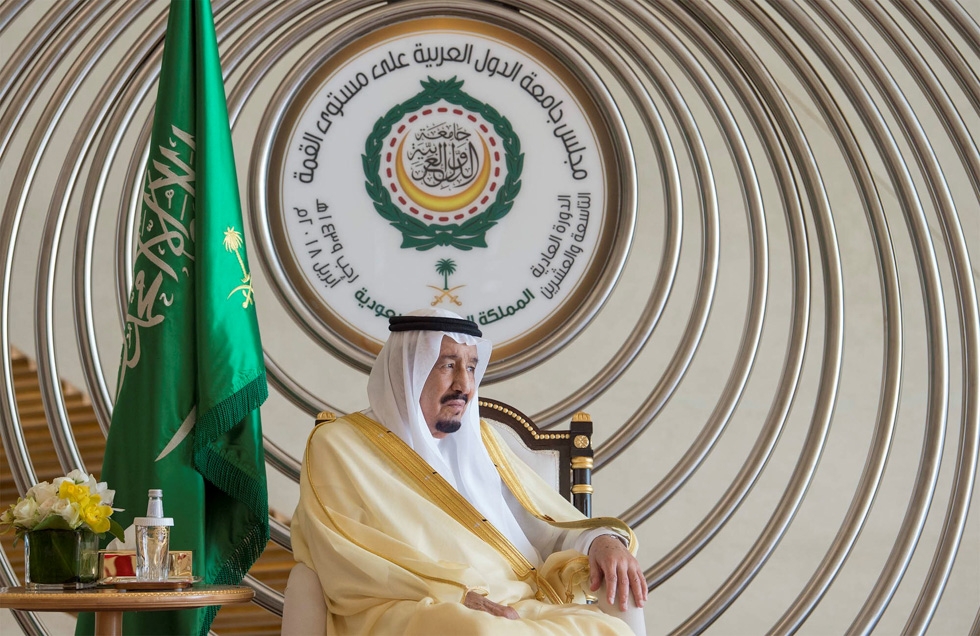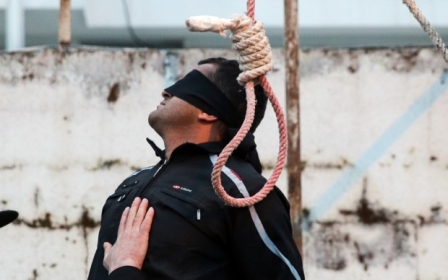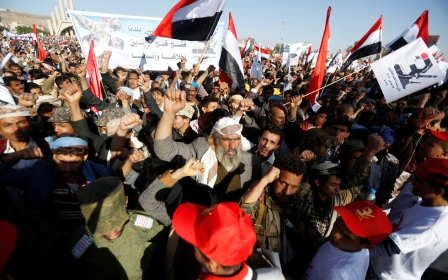At Arab summit, Saudi king slams Iran's 'blatant interference'

Saudi Arabia's King Salman on Sunday slammed Iran's "blatant interference" in regional affairs as Arab leaders met in the kingdom for an annual gathering.
Opening the 29th Arab League summit, the king also criticised the US decision to transfer its embassy in Israel to Jerusalem and described "terrorism" as the biggest challenge facing Arab leaders.
Seventeen leaders from across the Arab world gathered in the eastern Saudi city of Dhahran for the summit, which this year comes as world powers face off over Syria and tensions rise between Riyadh and Tehran.
The meeting opened only 24 hours after a barrage of strikes launched by the United States, Britain and France hit targets they said were linked to chemical weapons development in Syria, which was suspended from the league seven years ago.
But Salman avoided any mention of Syria in his address, as a seat marked "Syrian Arab Republic" sat empty in the hall.
Instead, the king focused on rivalries with long-time foe Iran – only 160km across the Gulf from Dharan.
"We renew our strong condemnation of Iran's terrorist acts in the Arab region and reject its blatant interference in the affairs of Arab countries," the king said.
And despite being a stalwart ally of the United States, the ruler also criticised US President Donald Trump's decision to transfer America's embassy to Jerusalem from Tel Aviv .
"We reiterate our rejection of the US decision on Jerusalem," Salman said. "East Jerusalem is an integral part of the Palestinian territories."
The final communique of the summit echoed Salman's comments on Iran and called for an international probe into the "criminal" use of chemical weapons in Syria.
"We stress our absolute condemnation of the use of chemical weapons against the Syrian people and we demand an independent international investigation to guarantee the application of international law against anyone proven to have used chemical weapons," said a statement distributed to journalists.
It emphasised the need for a political solution to the multi-sided Syrian war.
The communique called for more international sanctions on Iran and urged it to withdraw "its militias" from Syria and Yemen.
Delegates pledged to support the Palestinians, who want East Jerusalem to be the capital of a future Palestinian state. King Salman said Saudi Arabia was donating $200m to help them, including $50m for the UN Relief and Works Agency (UNRWA).
Qatar did not send a senior official, a sign that its 10-month-old dispute with Saudi Arabia, the United Arab Emirates, Bahrain and Egypt is still unresolved.
The four countries severed diplomatic and transport ties with Qatar last June, accusing it of supporting terrorism. Doha denies the charges and says the boycott is an attempt to impinge on its sovereignty.
Its delegation was headed by its permanent representative to the Arab League, Saif bin Muqaddam al-Buainain, Qatar's state news agency said.
Qatari Emir Sheikh Tamim bin Hamad al-Thani headed Qatar's delegation at last year's summit in Jordan.
Asked why Qatar was not on the summit's agenda, Saudi Foreign Minister Adel al-Jubeir said: "Because Qatar is not on the agenda. It's not a big issue. It's not a big problem. It's a very, very small problem."
He said the issue would be resolved if Doha met the boycotting countries' demands, which include closing the Al Jazeera television station and reducing ties with Iran.
Among the leaders in attendance was Sudan's Omar al-Bashir, who walked the red carpet and was greeted by King Salman. Bashir is wanted by the International Criminal Court for five counts of crimes against humanity, three counts of genocide and two counts of war crimes.
Summits of the Arab League, established in 1945, rarely result in action. The last time the bloc made a concrete move was in 2011, when it suspended Syria's membership over the Assad government's role in its civil war.
Middle East Eye propose une couverture et une analyse indépendantes et incomparables du Moyen-Orient, de l’Afrique du Nord et d’autres régions du monde. Pour en savoir plus sur la reprise de ce contenu et les frais qui s’appliquent, veuillez remplir ce formulaire [en anglais]. Pour en savoir plus sur MEE, cliquez ici [en anglais].



